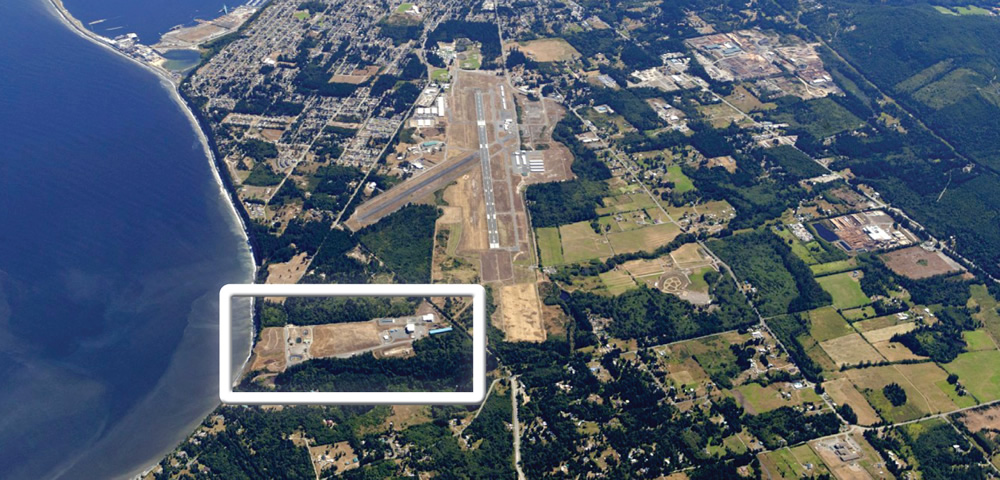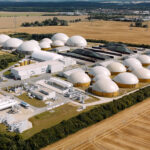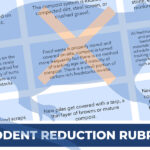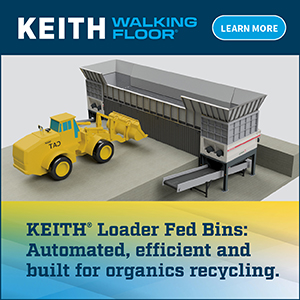Limited to a one-acre footprint, the City of Port Angeles, Washington strives to produce high quality compost for local markets.
Ashley Blazina
BioCycle August 2015
The solid waste management complex of Clallam County (pop. 73,000) is located on a 55-acre site in Port Angeles, Washington. The complex includes a transfer station, recycling center, household hazardous waste facility and the City of Port Angeles’ biosolids composting site. All facilities are operated by Waste Connections, Inc. The composting operation, owned by the City of Port Angeles, is located on a one-acre site in the complex.
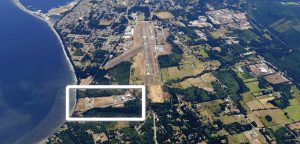
The Clallam County biosolids composting facility is on a 1-acre site
within a
55-acre solid waste management complex in Port Angeles. Photo courtesy City of Port Angeles
Anaerobically digested biosolids are dewatered on a belt press. Ground yard trimmings and biosolids are mixed in a 3:1 ratio and composted in aerated static piles. About 1,720 tons of biosolids and 3,290 tons/year of yard trimmings are composted annually. Finished compost is screened to a half-inch particle size using a Vermeer 510 trommel screen.
Solid Waste Superintendent Tom McCabe and facility manager Brian Tate work together to ensure the materials pass through the process smoothly. “Their biggest challenge is to move material and take compost samples on a very small footprint,” explains Helen Freilich, the City of Port Angeles’ waste reduction specialist. “Everything has to be timed very carefully.”
City staff coordinates the testing and marketing of the compost, branded “Garden Glory.” Freilich continually educates the public on how to use compost and the value of a biosolids product. “In every ad, in every brochure, we proudly announce we sell a biosolids compost,” she says.
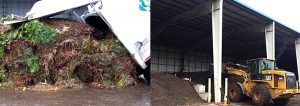
About 3,290 tons/year of yard trimmings, some from curbside collection programs (left), are composted (right) with about 1,720 tons/year of biosolids, mixed in a
3:1 ratio.
Marketing Pay Back
Before 2007, some of the biosolids were land applied but most were made into compost that was used for landfill cover. When the landfill closed in 2007, the City had to find a market for the compost. Staff originally planned to target larger scale users such as commercial landscapers, notes Freilich, who thought focusing on the higher quantity buyers first would give the City the most bang for its buck. However, in early 2008, when marketing efforts were starting to make headway, the housing slump occurred.
“We changed our focus to the individual and gardener,” she explains. “We started going to home shows and garden tours as well as the county fair, and giving away coffee bean bags filled with Garden Glory. ” Face-to-face contact has also helped Freilich and her team maintain transparency about what biosolids are, and better educate the public (and dispel rumors) more effectively than they could via social media such as Facebook.
The composting facility is open Monday through Saturday, from 9:00 am to 5:00 pm, making it convenient for customers to pick up compost on their own schedules. Compost is sold for $14 to $20/cubic yard. The minimum order is one cubic yard; discounts are available for schools and nonprofits. Customers are provided a list of local delivery services. The City also participates in the US Composting Council Seal of Testing Assurance Program.
In 2008, Freilich held a compost workshop to teach local business owners and gardeners about the specifics of biosolids-based products and their benefits. Although Freilich was at first disappointed that only six people attended the event, one of the participants was nursery owner Neal Burkhardt. Intrigued by the product, Burkhardt used the compost for potting trees and boasted to nursery customers about his plant’s secret growth ingredient. Although Burkhardt retired in 2014, the word-of-mouth advertising he provided at the nursery continues to reward the City with better compost sales.
Some of the compost has been used for small city and county highway projects. “We do not generate large enough quantities for most big state projects, but we are always trying to get whatever business we can,” says Freilich. “For use on playing fields and golf courses we need to screen to a smaller size. So purchasing a new screen in the future is a possibility.”
The solid waste processing complex neighbors the local airport, therefore the composting facility does not accept any type of organic waste (including food scraps) that would attract birds and create a hazard for aircraft. Due to its limited production capabilities, Freilich has taken steps to ensure that Garden Glory Compost is the highest quality possible. “For example, loads are checked at the scale house, as well as at the unloading area,” she says. “If plastic or any other contaminant is found in the load, it’s rejected.”
The composting facility operates under a solid waste permit instead of a state biosolids permit. As a result, the Class A (highest grade) biosolids compost production is overseen by the county environmental health department. Freilich remarks that this local partnership has helped the City maintain high standards for the compost while following all regulations.
The City’s goal is to have revenue from compost sales and the yard trimmings and biosolids tipping fees cover the contract costs. To address the year-round generation of biosolids combined with the seasonality of compost retail sales, Freilich would like to develop a partnership with a local business that could bag and sell the compost at local garden centers. This would alleviate the backlog of compost over the winter months. At the moment, she keeps the compost moving by regularly offering sales on the product. “In March 2015, we had a 40 percent discount on compost, which was perfect for all early-bird gardeners and landscapers who were eager to get some spring planting started,” notes Freilich.


